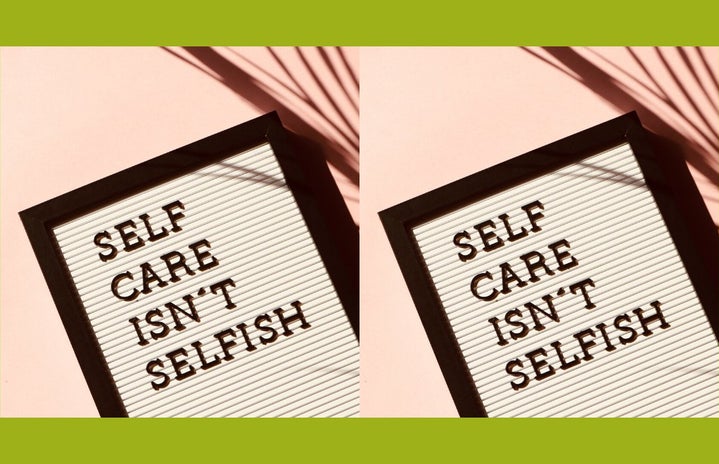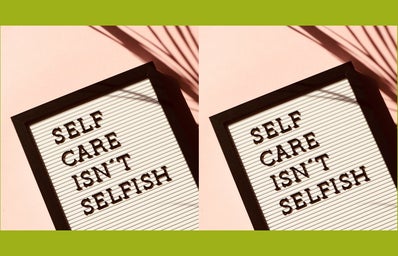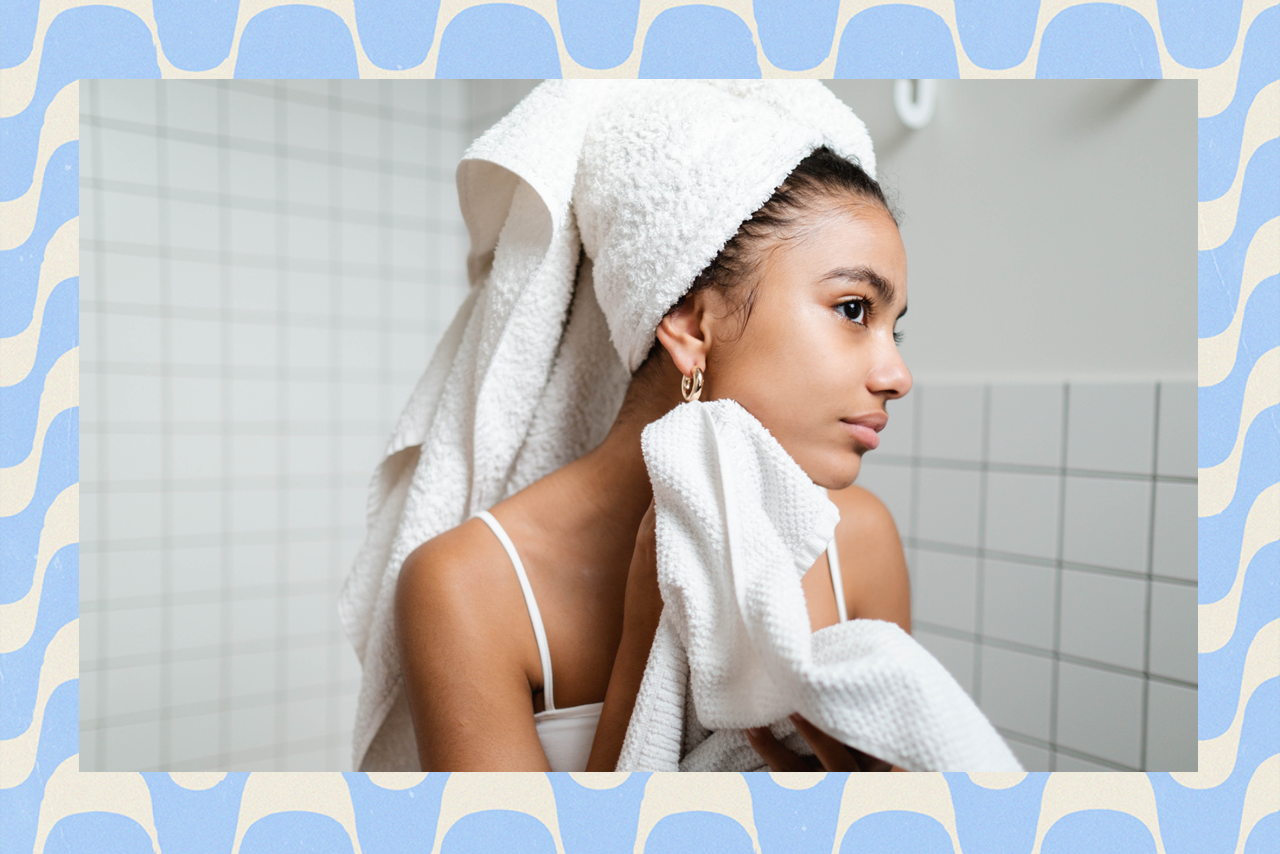Merriam-Webster Dictionary defines self-care as, “care[ing] for oneself”. This simple definition has somehow been perverted into a way for companies to take advantage of people by making them feel that buying their products will improve their overall well-being. If you go to any popular magazine’s website and type “self-care” into the search bar, nearly every article is meant to sell the viewer products that will “help” them achieve this fictional end goal of serenity. I feel that this is blatant manipulation of an already vulnerable demographic.
Mostly, people who are searching for self-care advice are people who are already struggling with mental and/or physical health. By telling your readers that “all of your problems will be solved” through purchasing a pair of Ugg slippers, you are being irresponsible and using your voice as a writer to prey on innocent people who just want help. Since this truly is a deeper issue with late stage capitalism that I will not be divulging in at the moment, for now, a simple thumbs down to that will have to suffice.
To clarify, I am not here to hate on face masks and other colloquial definitions of self-care, I love lighting a candle and letting my mind rest while I watch easygoing TV! My goal is to point out the contradictory nature of how self-care is marketed and to highlight what true self-care is.
My personal favorite definition of self-care is laid out by Active Minds, an organization that works to bring mental health discussion to college campuses across the nation. They describe self-care as doing things that take care of our minds, bodies, and souls. They believe that this can be achieved through participating in activities that promote your well-being and reduce stress.
Where I take issue with this organization’s opinions of self-care is that they believe that, “activities are a great way for us to distract ourselves from our current emotions until we are better able to cope”. Now, this clearly is intended to target people with severe mental illnesses, but I have a hard time believing that distracting ourselves from stressful situations and emotions is good for our mental health.
This leads me to my argument that certain aspects of the popularized self-care movement can actually cause more harm than good. If the goal of self-care is to “take care of yourself” then people need to make sure that their version of self-care does not inhibit actual self-improvement. Self-care is based on three main goals. While none of these goals are mutually exclusive, they are a good bedrock for anybody who is looking to improve their wellbeing.
The first goal of self-care is about growing into your best self. I believe that this can be achieved by limiting stressful situations through “getting ahead” of them. For example, it may not be fun, but studying and doing homework immediately after class (or work) can greatly reduce stress by giving you a sense of accomplishment and allows you to avoid procrastination induced stress. Plus, good grades improve self-esteem as opposed to low grades which tend to cause additional stress and sometimes even emotional depressions.
Reaching out to mentors can be another excellent way of “getting on top of it”. This can be executive members of any clubs you might be involved in, professors, GTAs, your boss, your parents, or anybody who can provide you with the guidance that you might need in the moment.
Another way that this goal can be fulfilled would be having a tough self-reflection. Now this is where the line between self-care and self-deprecation needs to be clear. Having time to sit down with yourself and reflect on your behavior can cause emotional distress for many reasons. This is why it is important to remember that you are doing this to care for yourself. I am not suggesting that you pick apart your entire personality. I ask that you go over what aspects of your personality may prohibit personal growth.
For example, I was disgustingly shy for so many years. It honestly wasn’t until the pandemic induced lock-down that I truly had time to think about myself as a person. I realized what I liked and what I didn’t like about myself. It was hard at times but I greatly benefited from reflecting on how I did not need to be embarrassed by merely existing. I realized that my shyness was rooted in insecurity that was caused by people who made me feel like I wasn’t worth being treated with kindness. While this reflection did not solve all of my problems, it was a stepping stone to my end goal of happiness.
Unfortunately, self-care is not about doing things that are fun or easy, it is about doing things that lead to growth.
I believe that current attitudes towards selfcare negate this goal by encouraging “days off”. Other blogs and magazines will suggest that it is important to take time off work in order to improve mental health. While this is not bad advice for some people, I would argue that most people actually struggle more so with procrastination. Therefore, if you struggle with procrastination and hear that “experts” suggest taking a break to prevent stress, you are more likely to fall behind and become even more stressed.
The second goal of self-care involves taking care of your body. Now I will admit that there are actually many self-care articles that do encourage exercise, so clearly the mark has not been totally missed.
Taking care of your body means eating right, exercising, and going to the doctor regularly. Doing these three things can greatly improve your physical health and get your body to peak performance.
The current ideals around self-care do tend to encourage exercise, but not many stress the importance of getting a checkup by the doctor. In fact, it seems that some articles inadvertently deter some people from going to places they find uncomfortable.
The idea of creating a safe space can greatly benefit many people, however, we should all be weary of the inherent problems associated with over indulging in safe-spaces. I should also clarify that I am not referring to safe space in the sense of a place void of bias, I am referring to sensory safe spaces such as your bed room.
I posit that the type of person who feels the need to invest in a safe space, is also likely to have some form of sensory issues. While I understand that sensory issues can be debilitating, you are not helping yourself by succumbing to them and locking yourself in your “safe space”.
Some people may fear the dentist or the general practitioner, but they are genuinely trying to help their patients live healthy lives. I like to think of the dentist as a trip to the spa, for my teeth specifically. It may be unpleasant having somebody stick their fingers in your mouth, but in the interest of self-care, it is necessary. Avoiding places that cause discomfort can, in some cases, be a form of self-neglect.
Another way to take part in physical health is to eat plenty of nutritious foods. Eating vegetables may not be the most fun after school snack for many, but it is important to fuel your body with food that will keep you moving.
Again, I am not here to hate on the occasional cocktail or cookie, I am simply stating that foods that provide no nutritional value or actively cause harm to your wellbeing do not fit into the narrative of self-care.
The third and final goal of self-care is taking care of your mind. Many aspects of this goal can relate back to the previous goals such as the benefits of exercise and preventing stress.
There are many ways to promote a positive mental wellbeing. Keeping your space clean is an excellent way to improve your mood. It is by no means an end-all-be-all, but decluttering your room can aid in decluttering your mind.
Being social has also shown many positive affects on people’s mental health. Even working to advance your knowledge can make you feel more confident overall.
It is important to do things that make you happy and promote your overall environment. Tell loved ones that you appreciate them, talk to them about your feelings, if you are seriously struggling with your mental health it is important to have somebody to talk to.
I believe that many self-care articles oversimplify this part of self-care by recommending that more people should take up journaling. Aside from the fact that most of these articles exist purely to convince you to buy an overpriced journal, they tend to encourage bottling your feelings up.
Journaling can be a great tool for working through your thoughts and feelings, but it does not replace the value of speaking to a person about what is troubling you. Keeping your feelings to yourself has actually proven to cause serious harm to your mind and body.
In summation, this new “trendy” version of self-care is not all that bad so long as you remember that self-care is about more than getting a rush of dopamine after purchasing an expensive bath bomb. Self-care literally means to take care of yourself. You are what is important! Remember the three goals of self-care: grow into your best self, upkeep practices that promote good physical health, and be assertive with your mental health. Take care of yourself, even if it is not fun, because you deserve to be happy.






